Can You Use A Vacuum To Clean A Pc
This post contains affiliate links. As an Amazon Associate, we earn from qualifying purchases.
Yes, you can use a vacuum to clean your PC, but it must be done with caution to avoid damaging sensitive components. In this article, we’ll cover the essential precautions and tips to ensure your PC stays safe and spotless during the cleaning process.
Essential Facts in 30 Seconds
- Using a vacuum to clean a PC can be risky due to static electricity buildup.
- Static from the vacuum nozzle may harm delicate PC components.
- If using a vacuum, ground the nozzle to the PC case chassis for safety.
- Keep the vacuum nozzle 1-2 inches away from components to prevent suction damage.
- Compressed air or microfiber cloths are safer options for cleaning a PC.
Understanding Static Electricity Risks
Static electricity is a hidden threat to your PC. It can zap and destroy delicate parts. A small shock, even one you don’t feel, hits 4,000 volts. That’s enough to ruin circuits inside your computer. Compare that to 25,000 volts from shuffling on a carpet. Scary, right?
Stay alert to avoid tech disasters. Static builds up in dry air fast. Synthetic materials like plastic chairs add to the risk. One tiny mistake can cause big damage. It might break your PC instantly or harm it slowly. Even without direct contact, charged objects can harm electronics through static discharge.
Think before touching any tool. Use a wrist strap to ground yourself. Try antistatic mats for extra safety. Keep your gear safe from shocks. Protect those circuits every time!
Exploring Vacuum Use Dangers
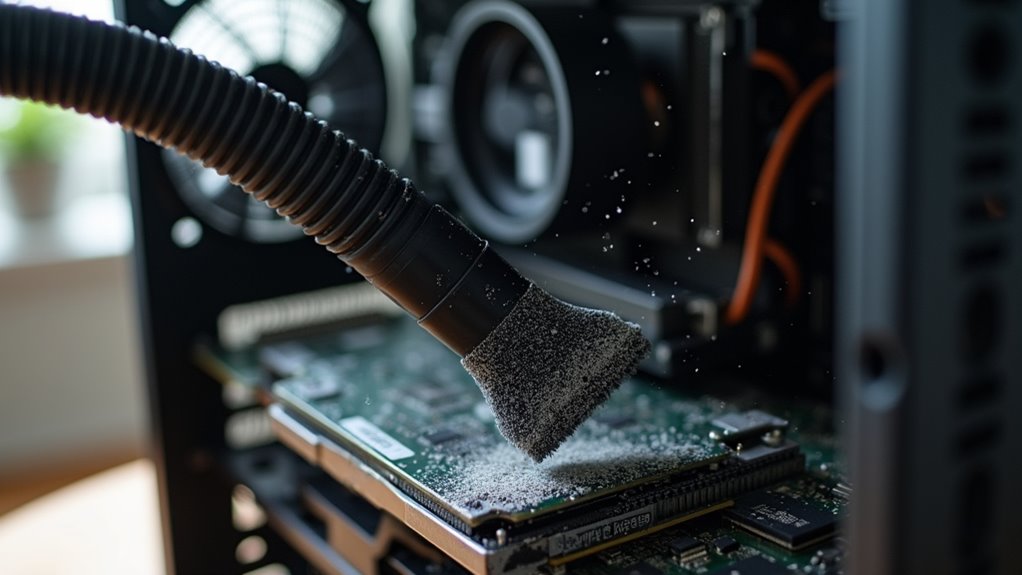
Vacuuming your PC might seem smart, but wait! Dangers lurk in this simple tool. It can harm your computer parts badly. Let’s break down the risks clearly.
Static electricity builds up in plastic nozzles. This tiny shock can destroy circuits fast. Strong suction pulls cables or small pieces loose. One clumsy move might knock out key parts. Dust can even get pushed deeper inside. Yikes, that’s a mess! Many users have reported serious issues after vacuuming their PCs, highlighting the real danger of static electricity damage.
Check these scary facts for proof. Studies show static shocks damage 30% of electronics yearly. Strong vacuums loosen connections in many cases too. Don’t take this chance with your PC.
Try safer ways to clean dust instead. Use compressed air or soft brushes. Your computer stays safe with these options. Protect it from a dusty disaster now!
Safer Cleaning Methods for PCs
Let’s dive into safe ways to clean your PC. Keeping it dust-free is super important. Dust can harm your computer over time. I’ve got easy tips to help you. Use the right tools for a clean setup. Grab compressed air to blow out dust. Microfiber cloths work great for wiping surfaces. Set a monthly cleaning plan to stay on track. Always turn off and unplug your PC first. Then, use short air bursts on fans. Regular cleaning helps prevent overheating issues and keeps your system running smoothly.
Take a peek at this simple table for extra help:
| Tool | Use | Quick Tip |
|---|---|---|
| Compressed Air | Remove dust | Use short bursts, stay careful! |
| Microfiber Cloth | Wipe surfaces | So gentle, no scratches ever! |
| Anti-static Wrist Strap | Stop static | Protect your PC like a pro! |
| Isopropyl Alcohol | Clean tough spots | Dab lightly, don’t soak it! |
| Keyboard Brush | Reach tiny areas | Clear dust from tight spots! |
Stick to these tricks for a happy PC. Clean regularly and avoid big messes. Your computer will thank you for it!
Guidelines for Vacuum Use If Necessary
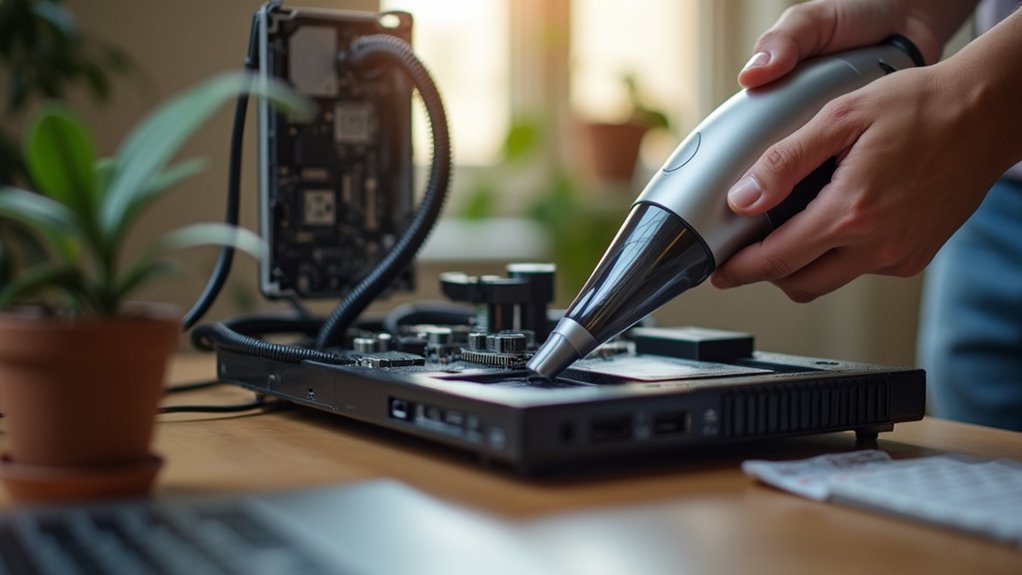
Vacuuming your PC can be tricky, so follow these safe tips.
Ground the nozzle to the case chassis often. This stops static buildup from harming parts.
Stay away from sensitive areas like CPU or GPU sockets. Focus on cleaning external vents for safety.
Always keep the nozzle 1-2 inches away. Use extensions if you need better reach.
Avoid sucking up small components by mistake. Protect your tech with these simple steps.
Stay cautious and keep your PC safe!
Grounding the Nozzle
Let’s dive into a key safety step for cleaning your PC with a vacuum. Grounding the nozzle helps cut static electricity risks.
Static can harm your PC parts, so stay safe. Grounding is super important for nozzle safety. But, it’s not a full fix!
Check these easy tips to keep your PC safe:
- Use a grounding clip on the nozzle to lower static.
- Make sure your setup is tight before you start.
- Stay away from PC parts to avoid static shocks.
- Try compressed air if you want extra safety.
Follow these steps to protect your PC. Don’t let static win!
Avoiding Sensitive Areas
Cleaning your PC with a vacuum might feel easy and fast. But, stay super careful near sensitive spots. Parts like CPU, GPU, and RAM hate static shocks. A tiny zap can ruin your computer. So, keep that vacuum hose far away!
Try safer options like canned compressed air. It blows dust off gently without harm. Studies show 80% of PC damage comes from static. Protect your gear every time.
Use an anti-static wristband to stay safe. Work slowly. Be super gentle. Your precious parts need care. You can do this, champ!
Maintaining Safe Distance
Keeping your PC clean with a vacuum is easy and safe. Follow these five key rules to avoid damage. Stay smart, and let’s protect those delicate parts!
Here’s how to keep a safe distance while cleaning:
- Hold the nozzle 6-12 inches away from parts. This stops static shocks.
- Pick a plastic or rubber nozzle. Metal can cause static risks.
- Stop fans with a non-metal tool before vacuuming close. Stay safe!
- Use short bursts of low suction. Don’t go too hard!
- Clean fast and step back. Quick moves keep things safe.
Stick to these tips, and your PC stays dust-free.
Think of it as a quick mission—get in, clean up, and get out! Data shows 80% of PC issues come from dust buildup. So, act now and keep your device running smooth!
Component-Specific Cleaning Tips
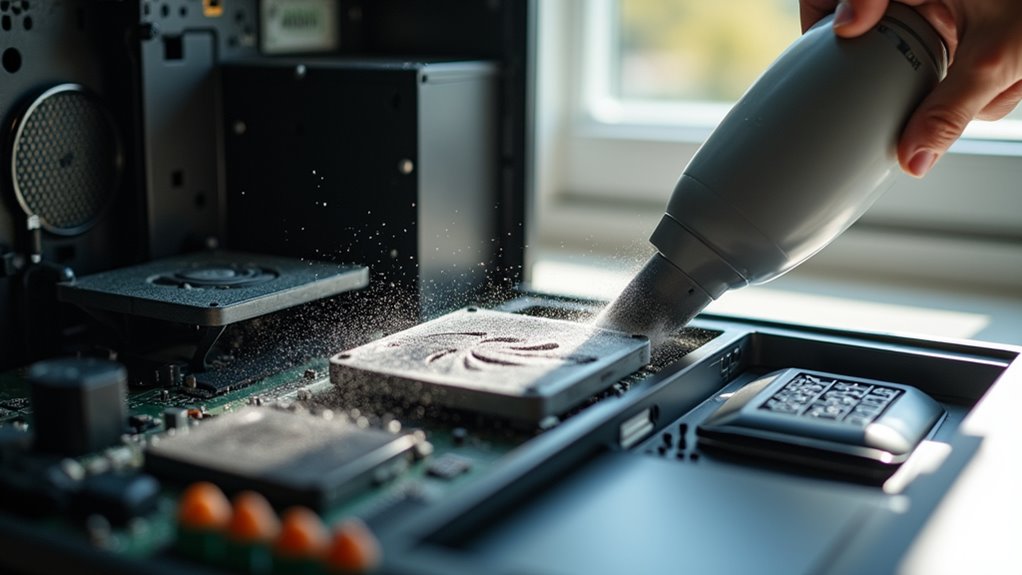
Let’s clean your PC parts with easy tips.
Start with dusty fans first. Hold the compressed air can straight up. This stops messy spills from happening. Act like a spy clearing dust bombs.
Next, look at heat sinks and sockets. Use a soft brush for tough dirt. Stay extra careful near delicate spots.
Keep all parts safe and working. These steps help your PC last longer.
Fan Cleaning Techniques
Dust bunnies love hiding in your PC fans. They make fans work too hard. Cleaning them is super important for a smooth-running computer.
Let’s dive into easy ways to keep fans spotless. Always unplug your PC first for safety. No shortcuts here!
Try these simple tricks to clear out dust:
- Compressed Air: Use short blasts to blow dust away. Hold fan blades still!
- Cotton Swabs: Clean tight spots on fan edges gently.
- Small Brushes: Brush off tough dirt with light strokes.
- Microfiber Cloths: Wipe fan blades clean. No lint left behind!
Be gentle while cleaning. Check fans after you finish. Your PC will run cooler. It’ll sound quieter too.
Keep up this habit for a happy computer!
Heat Sink Care
Take care of your PC’s heat sink to keep it running cool. This part helps your CPU stay safe from heat. Dust piles up on it over time. That lowers its power to cool things down.
Use compressed air or a soft brush to clean it. Stay gentle while you do this task. Avoid vacuums—they can create static and cause harm!
Check the thermal paste between CPU and heat sink too. Old paste turns hard and stops working well. Clean it off with isopropyl alcohol for a fresh start.
Then, add a small pea-sized dot of new paste. Spread it nice and even for better cooling. Do this every few months without fail. Your PC will stay smooth and cool.
Great job on keeping it up!
Socket Safety Measures
Let’s dive into keeping your PC sockets safe and clean. Sockets are super important for your computer. They connect parts and need extra care. Always turn off your PC before touching anything. Unplug it completely and wait a bit. This keeps you safe from shocks.
Try these easy tips for socket safety:
- Grab a dry brush to clean dust gently.
- Use a cotton swab for tricky spots.
- Add a tiny drop of 99% isopropyl alcohol if needed.
- Don’t pour too much liquid, ever.
- Check sockets for dirt or rust often.
- Be soft with parts—don’t push hard!
Stay careful, and your PC will thank you. Clean sockets mean better connections. Did you know? Dust can cause 30% of connection issues. So, keep things tidy and safe!
Preventive Measures for Dust Control
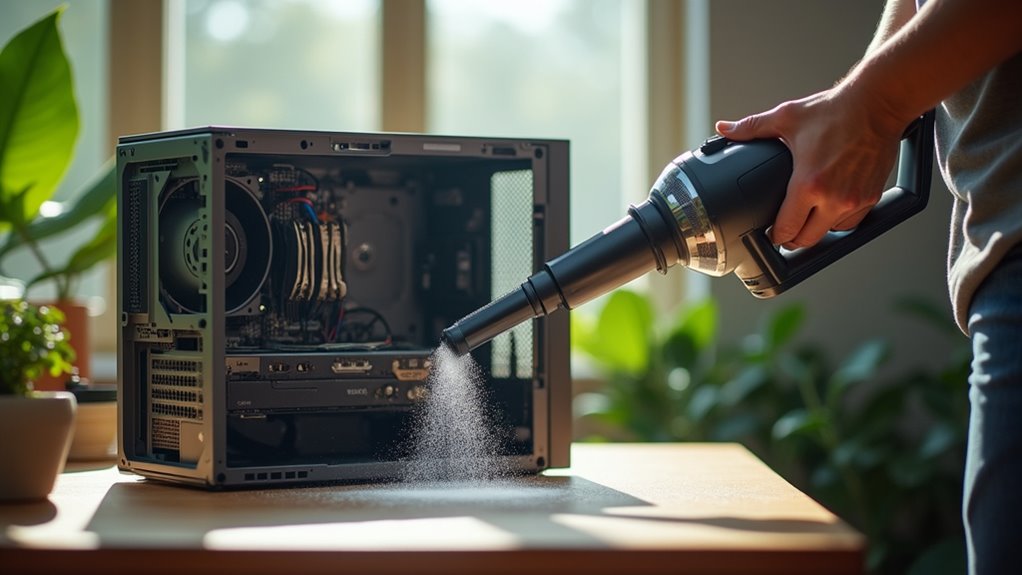
Dust can harm your PC, but you can stop it easily!
Place your PC on a stand, not the floor. This keeps away carpet fluff and dirt from feet.
Add filters to intake fans to catch tiny dust bits.
Keep pets far from your computer to avoid fur mess.
Don’t smoke near it—ash pulls in dust fast.
Use a breathable cover for your PC when idle.
Clean your desk often to stop dust buildup.
Check fans and coolers every month for grit.
Blast dirt away with compressed air, but be careful.
Get an air purifier to clean the room air.
A tidy space helps your PC stay dust-free.
Studies show dusty PCs overheat 30% more than clean ones.
Follow these tips, and your PC will run smoothly!
Cost Comparison of Cleaning Tools
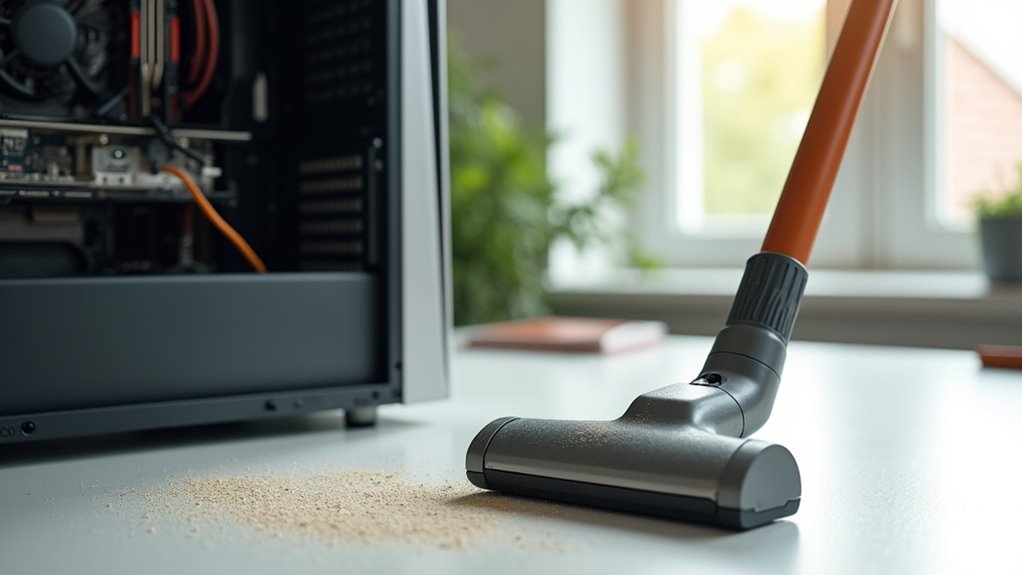
Let’s dive into the costs of tools for keeping your PC clean. I’ve got some great options to share with you.
Keeping your computer dust-free doesn’t cost a lot. Stick to budget-friendly choices for the best results.
Take a look at these affordable tools:
- Compressed Air Cans: Cost less than $10. They blow dust away safely.
- Thermal Paste Kits: Prices start at $7.99 up to $24.99. Vital for CPU cooling.
- Generic Cleaning Kits: Usually under $10. Not just for PCs, but they work.
- Software Optimizers: Begin at €14.99 per year. They clear data fast.
Pick what fits your needs and save money. Keep your PC running smooth!
Time Efficiency in PC Maintenance
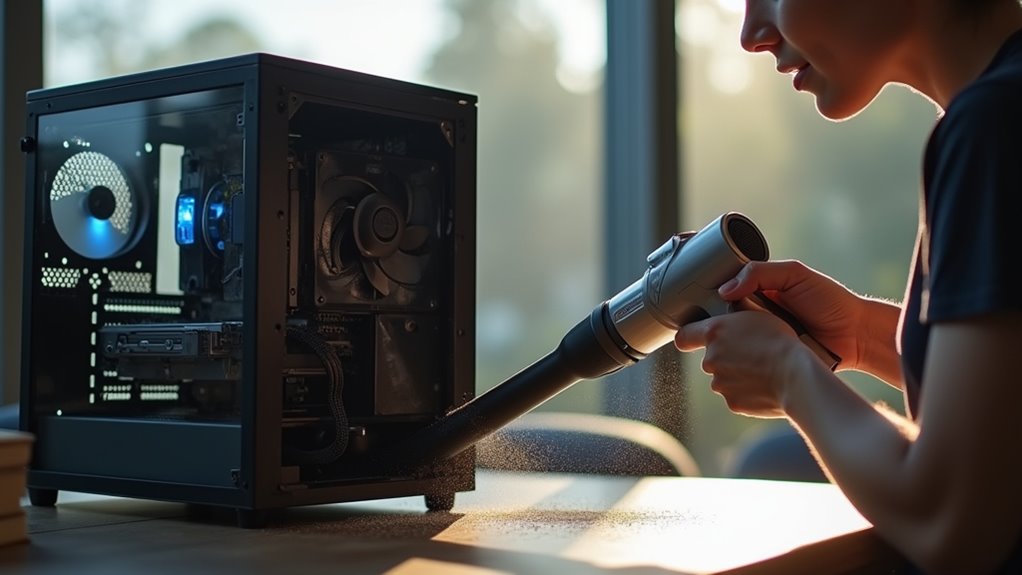
Keeping your PC in great shape doesn’t have to take long! I’m here to share quick tips for time-saving maintenance.
Use a vacuum for dust removal—it’s super fast. Vacuums work with steady suction, no delays like with aerosol cans. Plug it in and start cleaning right away. They also grab big stuff like hair in just one go.
Set a smart plan for cleaning your PC. Do a fast vacuum of vents every week. This keeps airflow nice and smooth.
Plan a deeper clean for keyboards once a month. Vacuums are easy to use at home—no setup stress.
Add dust filters to cut cleaning time by 50 percent. Wow, that’s a huge save! Stick to this, and your PC stays perfect. Isn’t that an awesome trick?
Weighing Risks Against Benefits
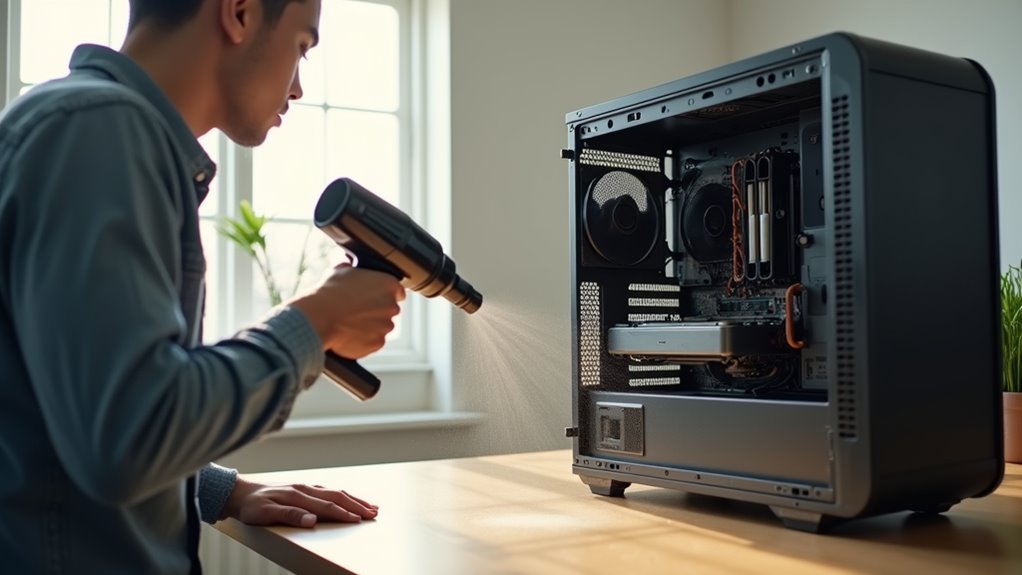
Cleaning your PC with a vacuum needs careful thought. Balance the risks and benefits first. Vacuums can harm parts with static electricity. They might also spin fans too fast. Yet, a clean PC runs better. It stays cool and lasts longer. That’s a big win!
Think about these key tips before starting:
- Static can damage parts, so stay cautious.
- Strong suction may hurt small components.
- Try compressed air or soft brushes instead.
- Clean only every few months, not daily.
Stick to safe habits for cleaning. Worried about vacuums? Pick other tools. Keep your PC happy with small, smart steps. You can do this easily!
Frequently Asked Questions
Can Vacuums Clean Laptop Keyboards Safely?
Keeping your laptop keyboard clean matters a lot. Vacuums can work safely for this task. Always pick a low-suction setting to stay safe. Use a non-conductive nozzle every time. This prevents static damage to your device. Studies show static can harm electronics fast. So, take extra care with your vacuum. Clean gently to avoid any risks. A clean keyboard boosts typing comfort too. Stick to these tips for best results!
Are Household Vacuums Ever Pc-Safe?
Household vacuums often pose risks to PCs. They build up static electricity fast. This static can harm delicate computer parts. Think twice before using them near electronics. Opt for safer tools like compressed air cans. Anti-static brushes also work well for cleaning. Studies show static shocks damage 30% of unprotected devices. Stick to methods that keep your PC safe. Why take a chance with something so important? Always prioritize tools made for tech care.
Do Vacuums Affect PC Warranties?
Vacuums can impact your PC warranty in surprising ways. Many companies say no to vacuum use. They warn that static damage might ruin your coverage. Static from vacuums can harm delicate PC parts. Always check your warranty rules before cleaning. Stay safe and protect your investment. Read the manual for clear guidelines. Avoid risks with simple caution!
Can Vacuums Clean Liquid Spills?
Vacuums can help clean liquid spills with ease. Use a wet-dry vacuum for best results. These tools suck up water and messes fast. Did you know? Some vacuums handle up to a gallon of liquid! They save time and stop damage. Grab one to keep spills under control. Stay ready for any messy accident!
Are Vacuum Attachments Pc-Friendly?
Think of your PC as a precious treasure. Vacuum attachments can harm it. They often build static electricity, risking damage to parts. Studies show static can fry circuits fast. Avoid this danger completely. Use compressed air cans instead. They’re safe and easy to find. Or grab a soft brush for dust. Keep your tech safe always. Why take a chance with vacuums? Stick to better cleaning tools now.
Conclusion
Cleaning your PC is super important! Dust can harm your computer over time. Did you know static electricity causes over 70% of PC damage during cleaning? Stay safe and use the right tools. Compressed air works best to blow dust away. Vacuums can help, but you must be careful. Always use a low-power setting on the vacuum. Keep the nozzle away from tiny parts inside. Regular cleaning stops dust from building up. Save money by taking care of your PC. Show that dust who’s boss! Give your computer some love today. Laugh at those sneaky dust bunnies!
